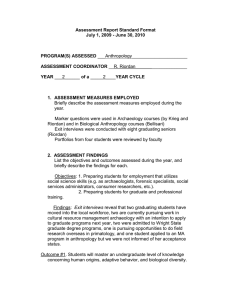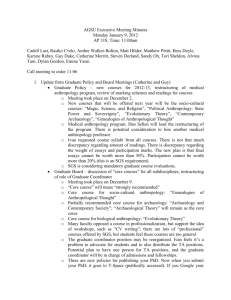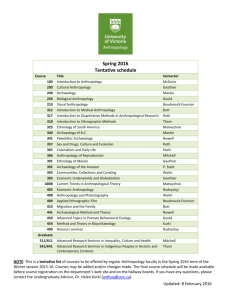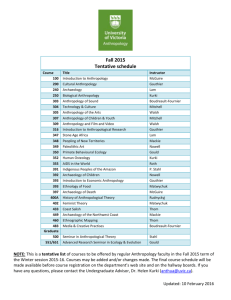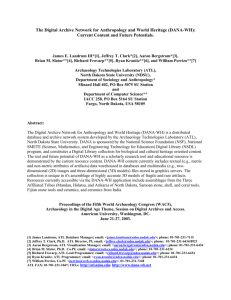Anthropology (B.A.) - Wright State University
advertisement
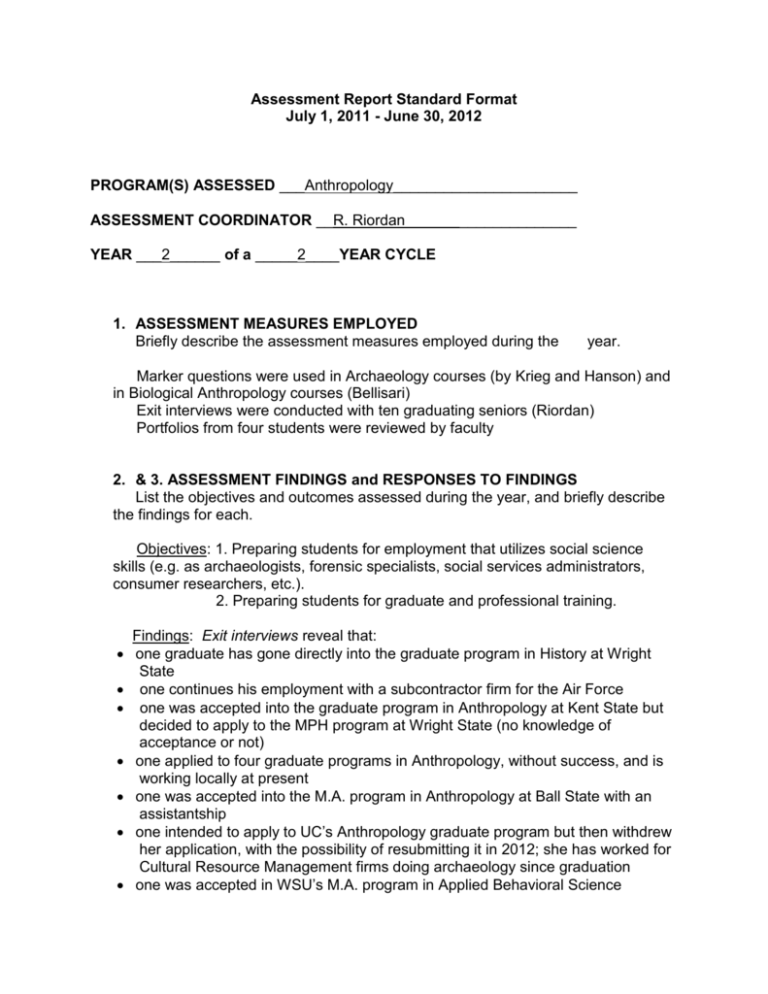
Assessment Report Standard Format July 1, 2011 - June 30, 2012 PROGRAM(S) ASSESSED ___Anthropology______________________ ASSESSMENT COORDINATOR __R. Riordan ______________ YEAR ___2______ of a _____2____YEAR CYCLE 1. ASSESSMENT MEASURES EMPLOYED Briefly describe the assessment measures employed during the year. Marker questions were used in Archaeology courses (by Krieg and Hanson) and in Biological Anthropology courses (Bellisari) Exit interviews were conducted with ten graduating seniors (Riordan) Portfolios from four students were reviewed by faculty 2. & 3. ASSESSMENT FINDINGS and RESPONSES TO FINDINGS List the objectives and outcomes assessed during the year, and briefly describe the findings for each. Objectives: 1. Preparing students for employment that utilizes social science skills (e.g. as archaeologists, forensic specialists, social services administrators, consumer researchers, etc.). 2. Preparing students for graduate and professional training. Findings: Exit interviews reveal that: one graduate has gone directly into the graduate program in History at Wright State one continues his employment with a subcontractor firm for the Air Force one was accepted into the graduate program in Anthropology at Kent State but decided to apply to the MPH program at Wright State (no knowledge of acceptance or not) one applied to four graduate programs in Anthropology, without success, and is working locally at present one was accepted into the M.A. program in Anthropology at Ball State with an assistantship one intended to apply to UC’s Anthropology graduate program but then withdrew her application, with the possibility of resubmitting it in 2012; she has worked for Cultural Resource Management firms doing archaeology since graduation one was accepted in WSU’s M.A. program in Applied Behavioral Science one was accepted into George Washington University’s M.A. program in Forensic Science, and is doing work at the Smithsonian Institution one was accepted into the M.A. program in Medical Physiology at Case Western Reserve University, with an intention to pursue an M.D. degree after completing the M.A. one played tennis professionally after graduation, and is currently (Nov. 2012) applying to law schools Outcome #1. Students will master an undergraduate level of knowledge concerning human origins, adaptive behavior, and biological diversity. Findings: Marker questions in two sections of the introductory course in biological anthropology (ATH 241). Section 1, questions: about Darwin’s contribution to evolutionary theory was answered 59% correct on the first exam about the Piltdown hoax, 97% correct on the last exam Section 2, questions: about gene frequencies from generation to generation, 58% correct on first exam about the Piltdown hoax, 97% correct on third exam An 80% correct rate is accepted as demonstrating mastery of the concepts. There was an obvious difficulty with two of the questions, which the instructor addressed subsequently during those courses. Outcome # 2. Students will master an undergraduate level of knowledge concerning the appearance and detection of archaeological sites. Findings: Marker questions were used in three sections of the introductory archaeology course (ATH 242). Section 1, questions: about transformation processes at a site, 97% correct about diagnostic artifacts/traits, 97% correct about an important heritage site in the western US, 90% correct about damage to cultural heritage, 90% correct Section 2, questions: about diagnostic artifacts/traits, 97% correct about transformation processes at a site, 100% correct about radiocarbon dating of sites, 76% correct about an important heritage site in the western US, 81% correct about damage to cultural heritage, 86% correct Section 3, questions: about radiocarbon dating of sites, 67% correct about an important heritage site in the western US, 78% correct about damage to cultural heritage, 74% correct about transformation processes at a site, 94% correct about the contents of the archaeological record, 75% correct An 80% correct rate is accepted as demonstrating mastery of the concepts. These findings are interpreted to generally reveal a general mastery of concepts, and they represent an improvement over previous year results. An essay question used in the summer Field School in Archaeology (ATH 369) concerned the discovery of features within an excavation context and was answered in A or B-graded responses by 100% of the students. (B or better graded responses on essay questions is the threshold used to evaluate mastery of content.) Outcome # 4. Students will be able to write coherent and substantive research papers and reports. The review conducted of four Portfolios demonstrated that these students had clearly mastered the ability to write forceful, economical, and substantive papers that were also well-documented. Scoring of the papers was conducted using a 10-point scale; on grammatical ability the students averaged 9.37; on the force and appropriateness of the arguments employed they averaged 9.18; and in the area of providing suitable documentation they averaged 10.0. This sample scored higher than any previous graduating groups, although it was biased by the fact that we received materials only from four of the ten graduates. A letter will be sent out again to majors, apprising them once again of the need for them to submit a writing portfolio at the time they seek a graduation check, in order to get a larger number of submissions. 4. ASSESSMENT ACTIVITIES FOR THE COMING YEAR A survey will be sent out to Anthropology alumni during the Spring semester 2013. We will continue to collect writing portfolios from graduating seniors and marker question data from introductory and selected upper division courses. 5. UNIVERSITY LEARNING OUTCOME ASSESSMENT University Learning Outcomes: Wright State Graduates will be able to: 1. Communicate effectively. 2. Demonstrate mathematical literacy. 3. Evaluate arguments and evidence critically. 4. Apply the methods of inquiry of the natural science, social sciences, and the arts and humanities. 5. Demonstrate global and multicultural competence. 6. Demonstrate understanding of contemporary social and ethical issues. 7. Participate in democratic society as informed and civically engaged citizens. Information will be collected to assess proficiency with respect to two of the University learning outcomes.

